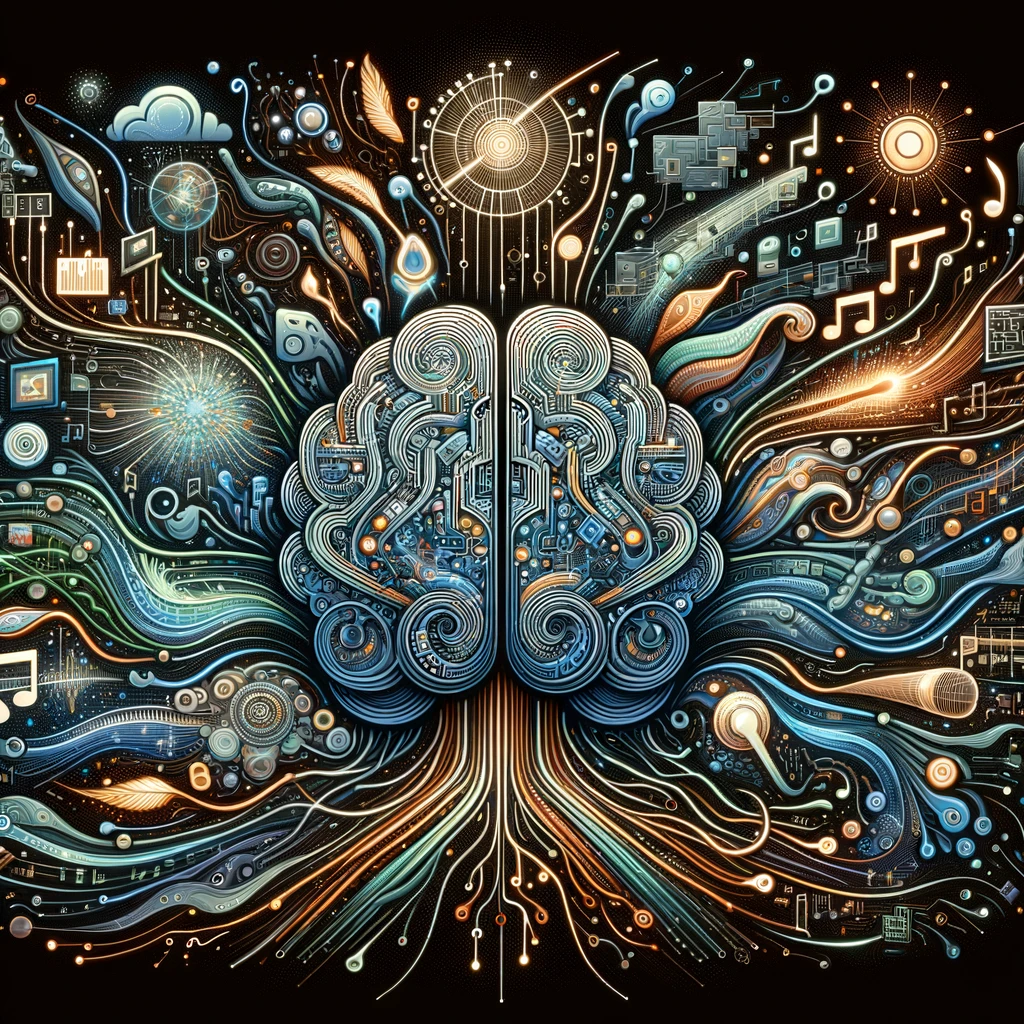Generative AI: Unleashing Creative Potential with Advanced Algorithms¶
What is Generative AI?¶
Generative AI refers to a class of artificial intelligence technologies that can generate new content or data that is similar to, but not identical to, the data it has been trained on. This innovative branch of AI utilizes advanced algorithms, including Large Language Models (LLMs), to produce a wide array of outputs such as text, images, music, and even code.
The essence of Generative AI lies in its ability to understand patterns, structures, and contexts from its training data and use this understanding to create entirely new, original pieces of content.

This technology has the power to revolutionize various fields by providing creative solutions, enhancing decision-making processes, and automating complex tasks that traditionally required human intuition and creativity.
Generative AI in Modern Applications: A Catalyst for Innovation and Efficiency¶
Why is Generative AI Important for Modern Applications?¶
Generative AI has become increasingly important in modern applications due to its unparalleled ability to create, innovate, and automate. By harnessing the power of Large Language Models (LLMs) and other advanced algorithms, Generative AI can generate novel content and solutions, ranging from textual content to intricate designs, that mimic human-like creativity. Its significance lies in several key areas:
-
Innovation and Creativity: Generative AI opens new avenues for creative expression and innovative problem-solving, enabling applications to produce unique and tailored content, designs, or solutions that would be difficult or time-consuming for humans to create.
-
Enhanced Efficiency: It automates the generation of complex content, reducing the time and resources needed for creation processes. This efficiency is invaluable in fields such as marketing, content creation, software development, and design.
-
Data-Driven Insights: Generative AI can analyze large datasets to uncover patterns and insights, aiding in decision-making and predictive analysis, which are crucial for businesses and research.
-
Personalization: It allows for the creation of highly personalized content and experiences for users, enhancing user engagement and satisfaction in applications ranging from digital assistants to content recommendation systems.
-
Scalability: Generative AI models can scale their creative capabilities according to the application's needs, making them versatile tools for businesses and developers looking to expand their services or offerings.
In summary, Generative AI's importance in modern applications lies in its ability to blend creativity with efficiency, offering innovative solutions and personalized experiences while streamlining processes and driving growth across various industries.
Generative AI: Evolving from Specialized Applications to Integrated Solutions¶
The First Generation of Generative AI: Focused on Specific Use Cases¶
The initial wave of Generative AI applications marked a groundbreaking period in AI development, primarily characterized by tools designed for specific, singular tasks. This early generation of Generative AI, while revolutionary, can be perceived as AI in its infancy - showcasing immense potential but often limited in scope. These applications, often complex in their underlying technology, were typically focused on generating one type of output, such as text for articles, images, or videos. Each application operated within its niche, demonstrating the capabilities of AI in creating content that was traditionally the domain of human expertise.
The Next Leap: Seamless Integration and Organizational Synergy¶
As Generative AI evolves, the next generation of applications is poised to transcend these initial limitations. The future landscape envisions AI applications that seamlessly merge multiple functionalities and use cases, offering a more holistic and integrated user experience. This transition represents a significant shift from single-purpose tools to versatile platforms capable of simultaneously executing various tasks in a unified manner.
Business Environment Transformation¶
In business contexts, this evolution in Generative AI will leverage the wealth of organizational knowledge and data. Future applications will not only generate content but also draw on and integrate with the existing data repositories and insights within an organization. This harmonious blend of generative capabilities and organizational data will unlock new levels of efficiency and innovation.
- Holistic Business Solutions: Upcoming Generative AI tools will serve as comprehensive solutions, addressing diverse business needs through a single, unified platform.
- Data-Driven Decision Making: By tapping into organizational databases, these AI systems will provide more relevant, context-aware, and data-informed outputs, aiding strategic decision-making processes.
- Transparent User Experiences: The complexity of underlying AI technologies will be masked behind user-friendly interfaces, ensuring ease of use and accessibility for all levels of technical expertise.
- Customized and Adaptive Tools: AI systems will adapt to the unique workflows and data landscapes of each business, offering customized solutions that evolve in tandem with organizational needs.
In summary, as Generative AI advances, we are transitioning from a phase of specialized, single-use applications to a more integrated, versatile, and organizationally synergistic era, marking a significant leap in AI's role in business and creative industries.